From May 13 to 16, 2025, the University of Tasmania (UTAS), Australia, in collaboration with Vietnamese partners: the National Institute of Animal Science (NIAS), Vietnam National University of Agriculture (VNUA), the Center for Rural Development in Central Vietnam (CRD) under Hue University of Agriculture and Forestry, and Focus Group Consulting Company, organized a mid-term review workshop for the research project “Integrating smallholder households and farm production systems into commercial beef supply chains in Vietnam” (AGB/2020/189). The workshop was held in Hanoi, with field visits to Nghe An and Thanh Hoa provinces. The AGB/2020/189 project, implemented from 2023 to 2026, is funded by the Australian Government through the Australian Centre for International Agricultural Research (ACIAR). In Vietnam, the Department of Economic Management (under the Economic Linkages and Market Development Research Group), Faculty of Economics and Management, VNUA, is a key implementing partner.
This multi-stakeholder project is being carried out in various provinces, including Hung Yen, Ha Nam, Hanoi, Nghe An, Thanh Hoa, and Quang Binh. Its core objective is to strengthen linkages between smallholder farmers, enterprises, and actors in the commercial beef supply chain. By promoting inclusive business models, the project seeks to improve household livelihoods and enhance smallholders' engagement in formal beef markets.
VNUA’s research team, led by Assoc. Prof. Dr. Pham Van Hung (Department of Economic Management, Faculty of Economics and Management), has contributed to components focused on assessing rural livelihoods and evaluating household cattle production systems in the target provinces.
    |
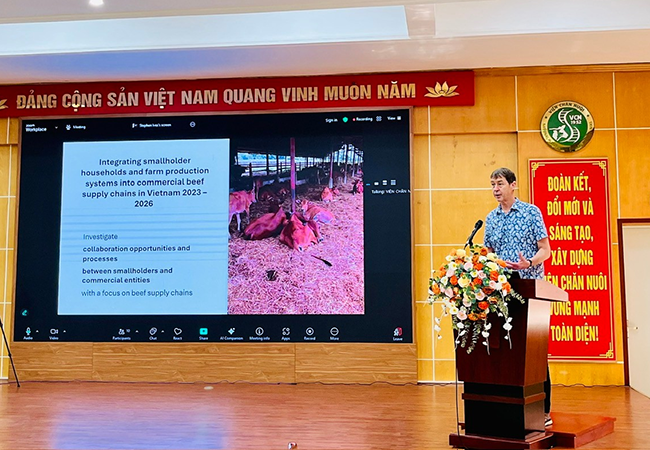 |
| Assoc. Prof. Dr. Stephen Ives, Project leader, the University of Tasmania (Australia), introduced the project and opened the workshop. |
The workshop was opened by Assoc. Prof. Dr. Stephen Ives, Project leader from the University of Tasmania, who provided an overview of project goals and progress. Researchers from UTAS, VNUA, NIAS, and CRD presented preliminary results across various research components.
During the initial research phase, VNUA researchers conducted detailed livelihood assessments in selected project sites. Findings indicated that due to declining beef prices, many farming households had diversified their income streams by raising pigs, shifting household labor (e.g., women working in industrial zones while men or elderly stay home to raise cattle), and using agricultural by-products (banana stems, corn stalks, brewer’s grain, tofu residue, and molasses) to reduce feeding costs. Innovative feeding practices, such as on-farm fermentation, phase-based feeding strategies, and silage production, were observed. Although farmers lack formal training, they actively engage in peer-to-peer learning and community knowledge exchange. However, youth involvement in cattle farming remains minimal due to more attractive non-farm employment options. Urbanization policies and environmental regulations have also placed pressure on agricultural land and activities, leading to the gradual decline of cattle farming's role in household livelihoods.
    |
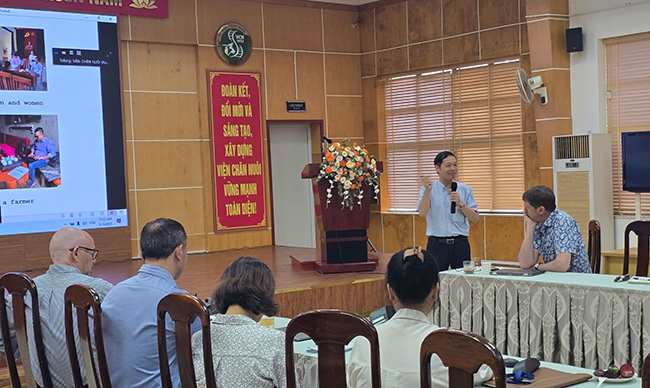 |
| Assoc. Prof. Dr. Pham Van Hung, team leader from VNUA, presented preliminary findings on household livelihood assessments |
Assoc. Prof. Dr. Nguyen Thi Duong Nga, representing VNUA, shared preliminary findings from Hung Yen province. The research highlighted diverse cattle production systems, with most households raising cattle in residential areas and relying on purchased calves. This has led to variability in calf quality. Feed sources include a wide range of forages and concentrates, and disease treatment is typically handled by farmers themselves. Manure management emerged as a major concern. Input and feed costs remain high, while falling output prices have negatively impacted the profitability of cattle farming. Additionally, relationships between farmers and traders are mostly short-term, lacking contracts or stable arrangements. Market access, information, and technical support are also limited. These constraints underscore the need for enhanced technical services (e.g., breeding, veterinary care), market linkages, and targeted policy support.
    |
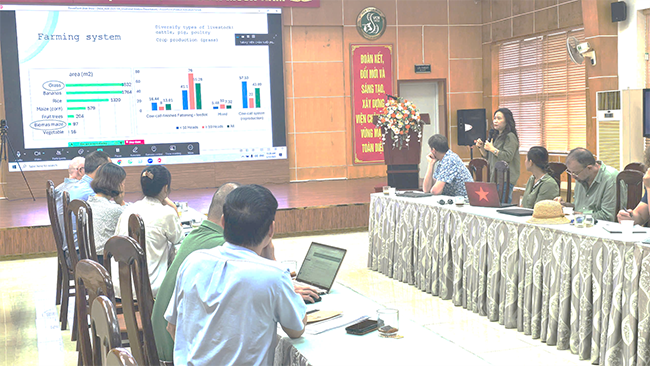 |
| Assoc. Prof. Dr. Nguyen Thi Duong Nga presenting the results of the assessment of beef cattle farming in Hung Yen province |
At the workshop, other project partners (UTAS, NIAS, CRD, Focus Group) presented findings on household economic modeling, supply chains for green fodder, commercial beef markets, and gender dimensions in beef production. Discussions also covered production constraints and opportunities for more inclusive and sustainable beef value chains.
    |
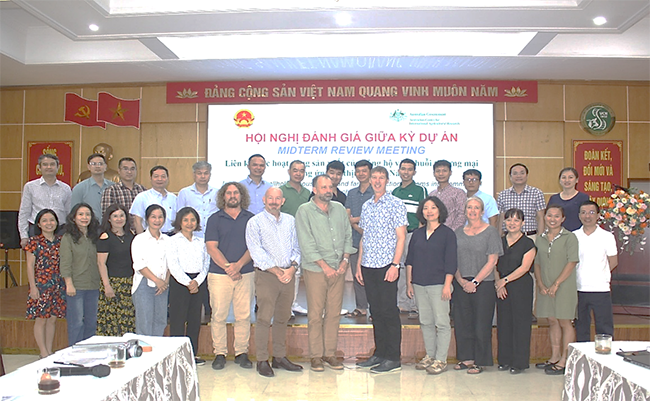 |
| Delegates and workshop participants taking commemorative photos |
During the workshop time, project reviewers, together with Vietnamese and Australian project partners, visited silage feed production linkage models in Thanh Hoa and Nghe An provinces to assess the challenges in implementing the project in Vietnam. These visits allowed participants to observe silage feed production and green fodder supply chains and to inform suitable proposals and adjustments aligned with actual conditions for the continuation of project activities.
    |
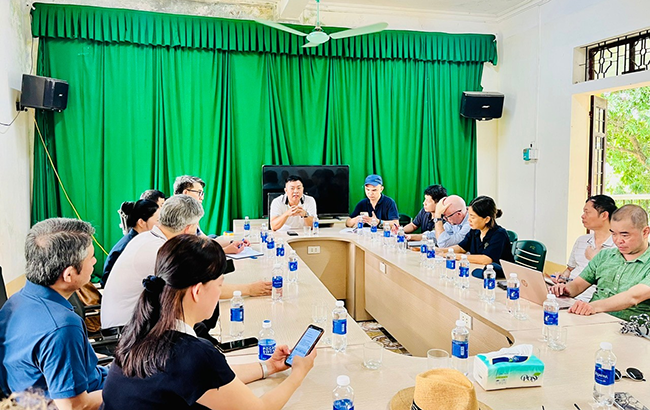 |
| Participants discussing at a silage feed production and supply company in Thanh Hoa |
    |
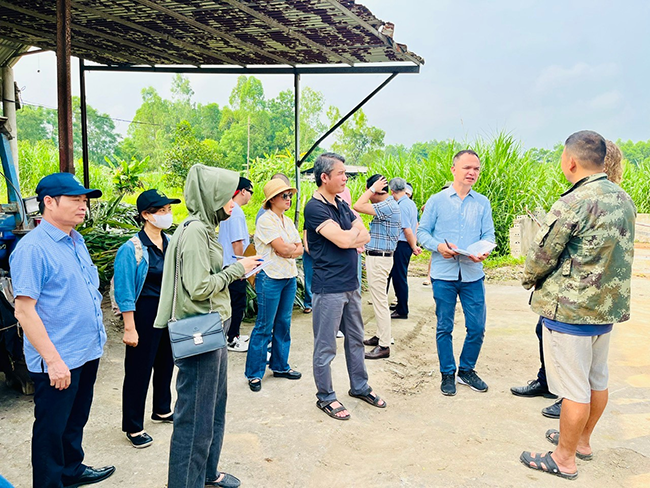 |
| Participants visiting a green fodder production and supply model in Nghe An |
On May 16, project partners and participants convened to review the progress and achievements to date. The review team expressed appreciation for the initial outcomes and suggested several strategic activities to enhance the project’s impact moving forward.
Ninh Xuan Trung, Pham Van Hung
Faculty of Economics and Management, VNUA